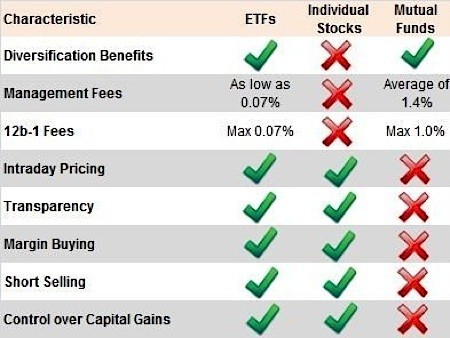Mutual Funds Exchange Traded Funds (ETFs)
Post on: 17 Май, 2015 No Comment

Most novice investors start by owning mutual funds but Exchange Traded Funds have become very popular in recent years.
Wikipedia’s definition of an ETF: an exchange-traded fund is an investment fund traded on stock exchanges, much like stocks. An ETF holds assets such as stocks, commodities, or bonds, and trades close to its net asset value over the course of the trading day. Most ETFs track an index, such as a stock index or bond index.
- Theyre both easy to buy and sell.
- They both offer lots of choices based on the types of securities that they hold. You can find funds specializing in a myriad of industries, countries and investment styles.
- They both offer investors the opportunity to reduce risk through asset allocation and diversification.
- Returns are not guaranteed. You can lose money in a mutual fund and in EFTs, because a funds value is nothing more than the value of its portfolio holdings. They are also not covered by government deposit insurance.
- Under performing funds are sometimes merged with other funds or discontinued. (In Canada last year, 48 new ETFs hit the market, 11 funds were terminated and there were three mergers.)
- Mutual funds are professionally managed and have research departments to help managers select securities for you.
- Mutual fund fees and expenses can be very high. Professional managers and their supporting staff arent working for free. Plus financial advisors are getting paid as long as you hold the fund.
- In addition to the management expense ratio (MER) of a mutual fund, there may also be sales fees called loads. These can be paid when you buy the fund or they may be deferred to whenever you decide to redeem your units. No-load funds are also available.
- Mutual funds can have tax consequences depending on your individual situation. So you may end up with taxable gains in a year when you dont have taxable losses to offset them even if you dont do any buying and selling.
- Managers are human. Managing involves judgment calls and some managers records are more successful than others. Managers also retire, switch companies or get fired.
- Choosing the right ETFs to create a portfolio to meet your goals requires more time and effort.
- Exchange traded funds have very low fees because there is very little trading within the fund unless a company or bond is removed or added to the index.
- ETFs may contain some investments that you don’t like. For example; the S&P/TSX Capped Information Technology Index Fund, contains shares of BlackBerry.
I dont think that mutual funds are fabulous investments. The high fees make it very difficult for the fund managers to beat their benchmark index. Why not simply buy an index fund with very low fees? For example you can buy the S & P 500 by purchasing SPDR S&P 500 ETF (SPY: AMEX). Plus, over the long run, lower ETF fees can increase your investment returns.














